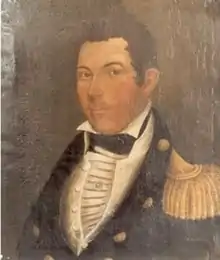James Armstrong (naval officer)
Commodore James Armstrong (17 January 1794 – 27 August 1868) was an officer in the United States Navy.
Commodore James Armstrong | |
|---|---|
 | |
| Born | January 17, 1794 Shelbyville, Kentucky, US |
| Died | August 27, 1868 (aged 74) Salem, Massachusetts, US |
| Buried | |
| Service/ | United States Navy |
| Years of service | 1809 – 1861 |
| Rank | Commodore |
| Commands held | |
| Battles/wars | War of 1812 |
Armstrong joined the United States Navy as a midshipman in 1809 and served on the sloop-of-war Frolic when it was seized by the British in 1814 during the War of 1812. Promoted to commodore and given command of the East India Squadron in 1855, Armstrong served aboard the squadron's flagship, San Jacinto during the Second Opium War. Following the battle of the Pearl Forts, Armstrong's health began to fail and he returned to the United States.
In 1860 Armstrong was given command of the Pensacola Navy Yard. On January 12, 1861, two days after Florida voted to secede from the Union he surrendered the facility to the secessionists.[1]
Captain Armstrong was Court Martialed on May 4, 1861. "The proceedings of Captain Armstrong's court martial appears to be missing from the rest of the proceedings deposited in the National Archives so the testimony surrounding exactly what happened that day between Conway and Renshaw that lead to the Court submitting a communication to Welles is unavailable. Conway eventually got "some appropriate mark of approbation" bestowed in 1939 and 1942 when hulls DD-70 and DD-507 were named in his honor." - General Naval Order
Armstrong was born in Shelbyville, Kentucky. He died in Salem, Massachusetts at the age of 74 and is buried in the Harmony Grove Cemetery.[2][3]
References
- Miller, J. Michael (Spring 1991). "Marine's Telling of 1861 Florida Navy Yard Fall Given" (PDF). Fortitudine. United States Marine Corps History Division. XX (4): 8.
- American Civil War
- Phillips Library Digital Collections